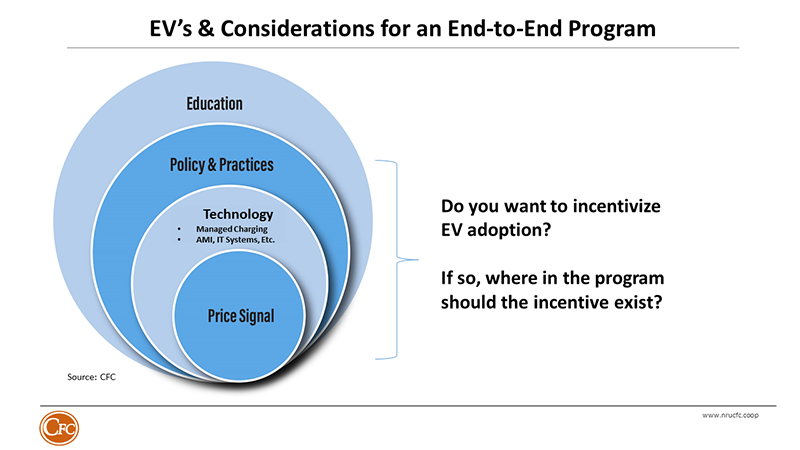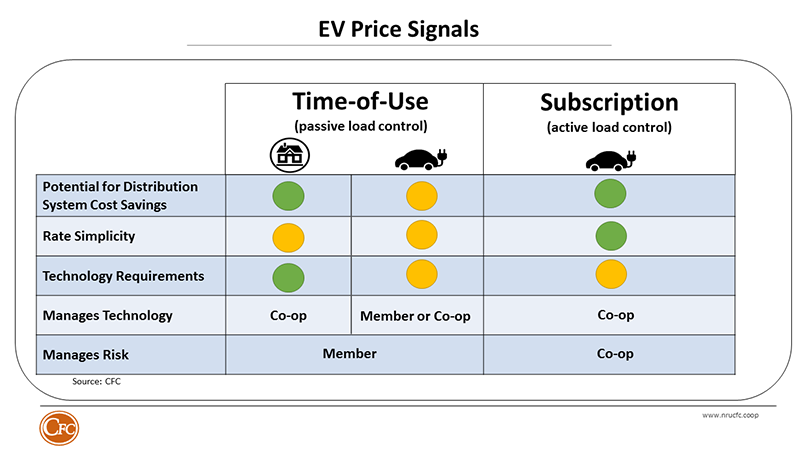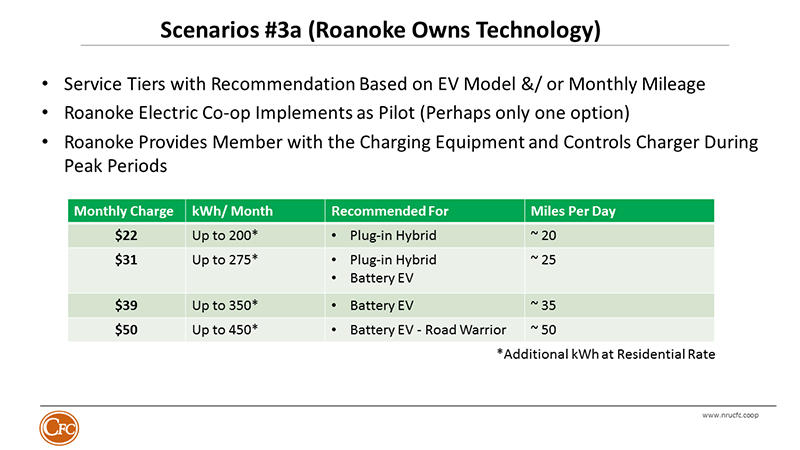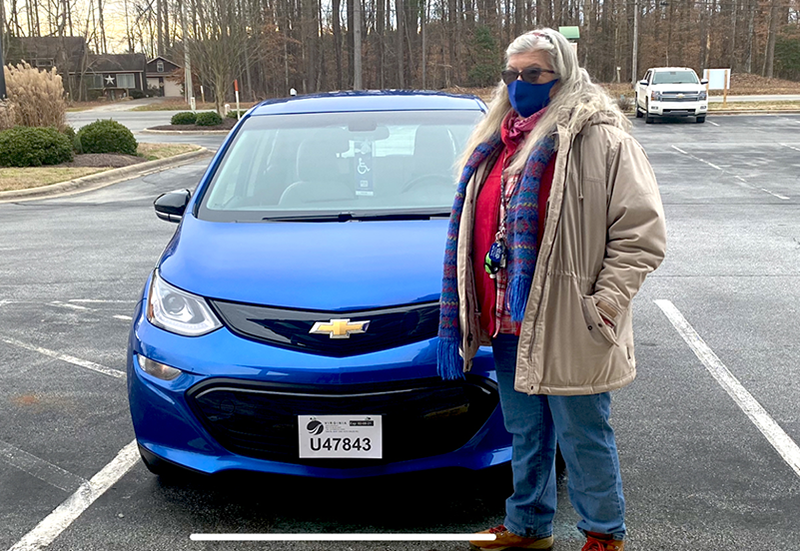CFC Helps Roanoke EC Launch New EV Subscription Rate Program
In December 2020, North Carolina-based Roanoke Electric Cooperative signed up its first member to a new pilot program featuring an innovative electric vehicle (EV) rate designed by CFC. Roanoke Electric’s residential EV pilot program features a flat-fee, subscription-based pricing model—one of the first uses of this model in the electric cooperative network.
Serving more than 14,500 members in the northeastern corridor of North Carolina, Roanoke Electric asked CFC to help design an EV program to include a specialty rate for EV charging.
“We wanted to encourage an EV market in northeastern North Carolina and offer our member-owners a path toward easier adoption of this emerging technology,” Roanoke Electric Chief Operating Officer Marshall Cherry said. “Additionally, having more members incentivized to charge their EVs off-peak could positively impact our wholesale power costs.”

CFC’s Regulatory Affairs team worked with Roanoke Electric to analyze the cooperative’s EV goals and put together an overall EV strategy and an EV incentive program that focuses initially on residential at-home charging. CFC facilitated discussions with national partner SEDC to understand billing capabilities of a new pricing structure and also with the technology vendor, ChargePoint, to understand metering capabilities and load management controls. Future projects may include public charging and fleet charging.
CFC also analyzed various rate options, including a traditional time-of-use (TOU) rate. But CFC’s analysis showed that a TOU rate was not effective nor cost-efficient for Roanoke Electric’s system and for their EV strategy. Upon further evaluation and discussion with the cooperative, CFC developed an alternative approach that features an EV subscription rate—a model that leaves the cooperative in control of the energy supply while offering members a discount on the standard residential rate for charging their EVs.

CFC developed several pricing options for the subscription rate, and Roanoke Electric selected a simplified, single-tier option that allows members to pay a flat monthly fee to charge their EVs during off-peak periods, up to a certain amount of kilowatt-hours (kWh).
Through this new EV program, Roanoke Electric owns the meter-grade Level 2 charger and is able to actively manage the EV load, while encouraging member charging at off-peak times—away from summer afternoon/evening peaks and winter morning peaks.
“Our goal was to establish a simpler rate than the three-tier time-of-use periods and demand/energy rate tariffs that we have seen at other utilities,” Cherry explained. “We also thought an easy-to-understand incentive model would create more conversations with member-owners about EVs.”

Under the new residential EV subscription rate, participants pay a flat fee of $50 per month for up to 450 kWh of electricity supplied during off-peak hours. According to Roanoke Electric, this rate is ideal for EV owners who charge their vehicles overnight and who drive 50 miles or less each day. The 450 kWh of electricity provided should enable participants to drive roughly 1,500 miles per month. The $50 per month subscription charge compares to about $185 that it would cost to drive a typical 20-mile-per-gallon gasoline-powered vehicle the same distance. The off-peak per kWh rate also represents a discount of about 16 percent from Roanoke Electric’s standard residential rate.
EV subscription rate participants also receive a 240-volt Level 2 charging station installed at their home at no cost. The charging station is maintained and owned by the cooperative.
Under terms of the service agreement, which CFC helped to draft, participants are able to plug in during off-peak hours (10 p.m. to 4:59 a.m.) at Level 2 charging capability of 240 volts and receive up to 450 kWh per month. Beyond 450 kWh, users are charged the standard residential rate per kWh.
During peak hours (5 a.m. to 9:59 p.m.), the voltage supplied to the charging station is reduced to Level 1 (120 volts), and energy supplied during peak hours is also charged at the standard residential rate per kWh.
Participants also agree to permit the cooperative to curtail their EV charger’s load when necessary during peak hours.
Although CFC’s analysis and development of the EV program was able to use existing system cost data and did not require a new cost-of-service study, it relied heavily on advanced metering infrastructure (AMI) data.
“The development of this EV rate could not have been accomplished without detailed AMI usage and billing data,” CFC Vice President of Regulatory Affairs Jason Strong said.
CFC Regulatory Affairs Rate Analyst Jason Fayorsey added, “We used AMI data to develop system and residential load profiles to determine Roanoke Electric’s peak usage versus their generation and transmission’s (G&T)—North Carolina Electric Membership Corporation—peak times and also matched cost to these periods. We then used AMI to establish peak and off-peak pricing hours for the subscription EV rate.”
In the future, Strong noted that Roanoke Electric’s new EV rate—and any others tied to peak and off-peak times—may need to evolve in response to changing consumer and industry dynamics such as accelerated consumer uptake of EVs, or increased deployment of renewable technologies.
“Today, off-peak is overnight, but on-peak could shift to these hours over time with greater EV adoption,” Strong said. “Off-peak may change to afternoon hours when it’s cheaper to serve with solar power. And overnight could become the new on-peak time.”
Fayorsey continued, “AMI data will assist in monitoring the success of the pricing periods and will provide key insights moving forward to indicate any modifications that may be needed to the EV program as EV adoption evolves and additional Roanoke member-owners come online.”
Roanoke Electric recently signed up the first member participant to its EV pilot program, which runs through December 2022.
 Patricia D’Angelo was the first member to sign up for the new pilot program.
Patricia D’Angelo was the first member to sign up for the new pilot program.
“The member-owner purchased their vehicle in late December, and we have spent January 2021 installing the charger, setting up the rate and programming load control,” Cherry said.
The use of EVs has been expanding in Roanoke Electric’s area, and the cooperative has been actively supporting the technology as a potential way to increase load and as a means of achieving its environmental stewardship goals.
“The EV concept is growing in this region and EVs are becoming a very important part of our work toward net-zero carbon emissions by 2050 and a 50 percent reduction in emissions by 2030,” Cherry said. “Our cooperative has been very active in working with local merchants and other organizations to set up a public charging infrastructure. We also have had individual meetings with area auto dealers to help build a local market.”
Roanoke Electric has also led a virtual EV community event introducing the new EV subscription rate to its members and added an incentive for early adopters—a $1,000 bonus for the first 10 subscribers.
“Our recent promotional activities and roll-out of our pilot program with the new EV rate has definitely stimulated inquiries from member-owners and created more conversations about EVs,” Cherry said. “We appreciate all the work CFC did in helping us put this program together.”
“CFC is a trusted partner that has a vested interest in the success of its borrowers,” Cherry added. “The CFC team listened to our challenges, which are somewhat unique, and responded with a subscription model that simplifies the process of engaging members and promoting this new technology.”
For more than 30 years, CFC’s Regulatory Affairs team has worked with member cooperatives—including both distribution cooperatives and G&Ts—on all facets of the rate design process. Work includes providing electric utility ratemaking, policy and advisory consulting services. The team also provides expert testimony in ratemaking proceedings, where necessary, before federal and state regulatory or legislative bodies.